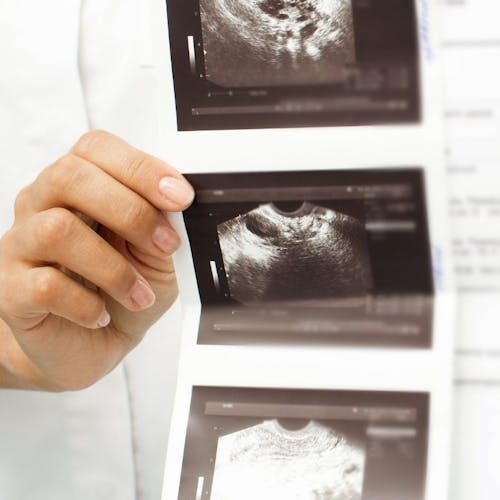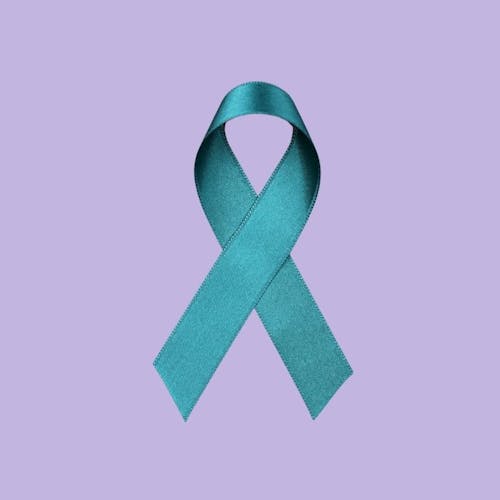This website uses cookies to enhance the user experience. By using Yoppie you are agreeing to our use of cookies.
PCOS vs PCOD: What’s The Difference?
Written by Yoppie
19 Nov 2021
What is PCOS?
OK, so what is PCOD and how is it different?
Are the symptoms the same?
What about differences in treatment?
I think I might have PCOD. What do I do?
If you’re up to date on your menstrual acronyms then you may already be familiar with PCOD, but if not, don’t worry. It’s a term that is very rarely used, and often used interchangeably with PCOS despite there being several differences. Let’s take a look at those differences, what causes the condition, and how it’s treated.
What is PCOS?
PCOS stands for polycystic ovary syndrome, and is a common condition that affects how a person’s ovaries function - they become enlarged with fluid-filled sacs (follicles) that grow around the eggs. PCOS tends to create symptoms like irregular periods, excess androgen which leads to excess facial or body hair growth, and fertility issues due to the process of ovulation being inhibited.
OK, so what is PCOD and how is it different?
PCOD stands for polycystic ovary disease. It’s often difficult to distinguish between this and PCOS since the origins and symptoms are so similar. To put it simply, PCOS is a more serious disorder of the endocrine system that can have complications such as diabetes, high blood pressure, and fertility issues. An estimated 1 in 10 UK women are thought to have PCOS, so it’s pretty common, but surprisingly not as common as PCOD.
PCOD develops due to an imbalance of hormones, but can often be put right with lifestyle changes and doesn’t tend to leave lasting fertility issues. It is thought that almost a third of women around the world may have PCOD, many without a diagnosis. While polycystic ovary syndrome often becomes apparent earlier in life as the symptoms can be seen in teenagers, polycystic ovary disease is typically diagnosed later in life.
At the core of the issue, the difference between PCOS and PCOD is that PCOS can have serious general health implications and cannot be cured, while PCOD can usually be treated by implementing the correct diet and exercise routine, and making other lifestyle changes.
Are the symptoms the same?
PCOS symptoms are fairly well documented, and include irregular periods (or no periods), fertility issues due to irregular ovulation, excess hair growth on the face, chest or back, weight gain, thinning hair or hair loss from the head, or skin issues.
PCOD symptoms aren’t so clear, and are easily mistaken for PCOS. Symptoms include irregular periods (rather than no periods), heavy bleeding, abdominal weight gain, and obesity. In both conditions, genetics are thought to play a major role, as many PCOS and PCOD patients find that they have a family history of the condition.
What about differences in treatment?
Though there is no cure for PCOS, getting the right treatment as early as possible can help reduce your symptoms and prevent long-term complications. If you are diagnosed with PCOS, your doctor may recommend:
- Medicine to treat insulin resistance
- Medicine to help with fertility issues and encourage ovulation
- Birth control to regulate your menstrual cycle
- Antibiotics or skin treatments to reduce acne
- Waxing, shaving or electrolysis/laser treatments to remove excess facial and body hair that grows due to higher amounts of the hormone androgen
In both PCOS and PCOD, healthy lifestyle changes can make a big difference in reducing the symptoms of both conditions. In the case of PCOD, these are often recommended by a doctor and could potentially cure the condition completely. Here are some healthy lifestyle changes that can make a difference:
- Implement a healthy diet with less sugar, salt, junk food, alcohol and caffeine
- Engage in a regular exercise routine to lower stress, blood pressure and reduce sleep problems
- Maintain a healthy body weight to keep testosterone, insulin and LH (luteinizing hormone) levels down
- Quit tobacco products to help lower androgen levels
I think I might have PCOD. What do I do?
Polycystic ovary disease is a difficult condition to diagnose as the symptoms can present much the same as PCOS. If you are having any of the aforementioned symptoms and want to make sure your body is working as it should be, don’t be afraid to reach out to your GP to discuss it and begin the appropriate treatment.
Want to know more about PCOD or PCOS? Start a conversation over in our private Full Stop FB group or ask us your Qs on Insta at @itsyoppie - we’re always happy to answer! Don't forget that our personalised period box can get organic tampons, PMS supplements and much more delivered easily and regularly through your letterbox, so that's one less thing to worry about each month.
Section jump
Back to top
Subscribe To Our Newsletter
YOPPIE





© 2026 Yoppie is a registered trademark of Phlo Technologies Ltd.
Yoppie's supplements are not a substitute for a varied diet and healthy lifestyle and are not intended to diagnose, treat, or cure any disease. If you are pregnant, breastfeeding, have a medical condition or are under medical supervision, please consult with your doctor before taking any of our products.






